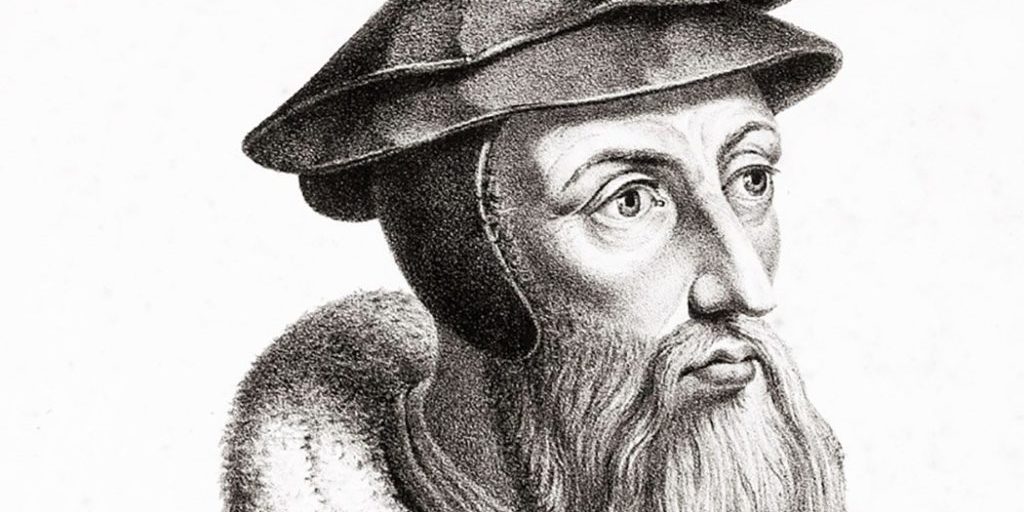
After darkness, light: How Calvin saved the Reformation
Celebrations of the Reformation typically revolve around the larger-than-life reformer, Martin Luther. On this Reformation Day, however, I would like to wind the clock forward two decades after Luther posted his monumental 95 theses to a debate you may never have heard of before: the Reformation debate between John Calvin and Cardinal Jacopo Sadoleto.
Return to Rome…while you still can
On March 18, 1539, Cardinal Jacopo Sadoleto, bishop of Carpentras in southern France, wrote a letter to the magistrates and citizens of Geneva. Why? Sadoleto’s purpose was strategic: He was writing to the Genevans in order to persuade them to return to Rome.
Sadoleto’s letter was timely. Previously, in April of 1538, John Calvin and Guillaume Farel had been banished, exiled from the pulpit, due to conflict with the civil authorities in regard to ecclesiastical authority and reform. Now was the perfect opportunity to write to the Genevans in order to bring them back to the Catholic fold.
However, the council that received Sadoleto’s letter, committed as they were to the Protestant Reformation, struggled to find a worthy theologian for the task of responding to Sadoleto. So, the letter was sent to Bern, who assured the Genevan magistrates that an appropriate responder would be recruited. Calvin was the obvious choice. Once agreed upon, the letter was sent to Calvin in Strasbourg, who would take but six days to respond.
The opportunity of a life-time
The two letters reflect the central issues under debate during the Reformation: the formal principle (sola scriptura) and the material principle (sola fide). Notice, these are the same theological tenets at stake in Luther’s Reformation two decades earlier.
Sadoleto argued that the Genevans had departed from the one, true Church, which does not error. The Church “errs not, and even cannot err, since the Holy Spirit constantly guides her public and universal decrees and Councils.” The dilemma for the Genevans is serious:
Whether is it more expedient for your salvation . . . by believing and following what the Catholic Church throughout the whole world, now for more than fifteen hundred years . . . approves with general consent; or innovations introduced within these twenty-five years, by crafty, or, as they think themselves, acute men; but men certainly who are not themselves the Catholic Church?
In my opinion, this is one of the greatest descriptions not only of sola fide, but solus Christus as well. Click To Tweet According to Sadoleto, Calvin and the Reformers “tear the spouse of Christ in pieces,” but now the Genevans, with Calvin banished, have the opportunity of a life-time: they can return to the one, true faith of the one, true church.
Additionally, Sadoleto scoffed at the Reformation dogma of sola fide. Yes, said Sadoleto, we obtain the blessing of “complete and perpetual salvation by faith alone in God and in Jesus Christ.” Yet Sadoleto quickly clarifies that when
I say by faith alone, I do not mean, as those inventors of novelties do, a mere credulity and confidence in God, by which, to the seclusion of charity and the other duties of a Christian mind, I am persuaded that in the cross and blood of Christ all my faults are unknown; this, indeed, is necessary, and forms the first access which we have to God, but it is not enough.
“For Sadoleto,” observes John C. Olin, “the process of justification must encompass good works, and faith, used in the justification formula, must be understood as more than a ‘mere credulity and confidence in God.’”
Calvin and the purity of the gospel
How did Calvin respond? With theological vigor that set the entire Reformation in proper perspective.
First, Calvin accuses Sadoleto of misconstruing the proper relationship and order between the Spirit, the Word, and the Church. The Spirit, says Calvin, “goes before the Church, to enlighten her in understanding the Word, while the Word itself is like the Lydian Stone, by which she tests all doctrines.” The Church did not create the Word, but rather the Word of God, by the power of the Spirit, created the Church. It follows, then, that the Church is to test all doctrines by the inerrant standard and authority of the Word. The issue, in other words, is one of authority. Whereas for Sadoleto it is the Church that carries equal (if not greater!) authority than Scripture, for Calvin Scripture alone is God-breathed, without error, and, therefore, our sufficient and final authority.
Moreover, Calvin unravels Sadoleto’s argument at the seams by exposing the corruption of the Church. The “purity of the gospel,” says Calvin, has been compromised through seeds of superstition, sown by “monsters of impiety.” Calvin is indignant. The Church has been robbed and devoured by its own leaders. The “sacred Supper” has been replaced by “a sacrifice, by which the death of Christ is emptied of its virtues.” Indulgences have “crept in with fearful dishonour to the cross of Christ.” And the Church is now characterized by “the accursed worship of images.” For the sake of human traditions “Christian liberty has been crushed and destroyed.”
All in all, the light of divine truth has “been extinguished, the word of God buried, the virtue of Christ left in profound oblivion, and the pastoral office subverted.” And at the same time, “impiety so stalked abroad, that almost no doctrine of religion was pure from admixture, no ceremony free from error, no part, however minute, of divine worship untarnished by superstition.” The Roman Pontiff and “his whole herd of pseudo-bishops, who have seized upon the pastor’s office, are ravening wolves, whose only study has hitherto been to scatter and trample upon the kingdom of Christ, filling it with ruin and devastation.” The situation could not be worse.
The Reformers, on the other hand, have “been careful to purge the churches which the Lord has committed to us.” While Sadoleto views the Reformers as declaring war against the Church, the Reformers contend against such evils to assist her in “her extreme distress.” But if Reformation is to occur then the Church must submit to the supreme authority of the Word of God.
The only haven of safety: the mercy of God
Second, Calvin refutes Sadoleto’s case against justification by faith alone (sola fide). Justification, says Calvin, is the “first and keenest subject of controversy between us.” Here is the very core, the very heart-beat of the debate. Wherever sola fide is abandoned, “the glory of Christ is extinguished, religion abolished, the Church destroyed, and the hope of salvation utterly overthrown.” Yes, like Luther, for Calvin sola fide is the doctrine on which the Church stands or falls! Sadoleto and Rome, however, have “nefariously effaced” sola fide “from the memory of men.”
Like the apostle Paul in Romans, Ephesians, and Galatians, Calvin begins with man’s own depravity and guilt before a holy God. Calvin bids every man to examine himself and he will be “confounded and amazed at his misery.” All self-confidence will be abandoned as he is “given up to final perdition.” Then, and only then, will the sinner understand that “the only haven of safety is in the mercy of God, as manifested in Christ, in whom every part of our salvation is complete.” Calvin writes,
As all mankind are, in the sight of God, lost sinners, we hold that Christ is their only righteousness, since by his obedience, he has wiped off our transgressions; by his sacrifice, appeased the divine anger; by his blood, washed away our stains; by his cross, borne our curse; and by his death made satisfaction for us. We maintain that in this way man is reconciled in Christ to God the Father, by no merit of his own, by no value of works, but by gratuitous mercy. When we embrace Christ by faith, and come, as it were, into communion with him, this we term, after the manner of Scripture, the righteousness of faith.
In my opinion, this is one of the greatest descriptions not only of sola fide, but solus Christus as well. Christ’s atoning sacrifice, which satisfied the wrath of God on our behalf, is the sole basis for our justification. Our right standing with God is not grounded upon any merit of our own, any good works we have accomplished. It is purely and only upon the gratuity of divine mercy in Christ Jesus that the sinner is declared righteous before God. It is not our obedience, but the obedience of Christ that is our only righteousness.
Naturally, then, no room is left for works in justification, as if we could somehow merit God’s favor. Scripture teaches everywhere, says Calvin, that we are hopeless and lost, and our conscience bitterly accuses us. Our only hope is the “mere goodness of God, by which sin is pardoned, and righteousness imputed to us.” Yet where exactly does this “righteousness” come from? Not from us. It cannot be our own righteousness, but it must be an alien righteousness, namely, the righteousness of Christ. Our reconciliation is to be found not within ourselves, but in the gospel.
Post Tenebras Lux
Calvin’s reply to Sadoleto was personal. Calvin did not merely write in defense of the Reformation, but his response was a reflection on his own conversion experience. Near the end of his reply, Calvin has a rare moment of transparency:
My mind being now prepared for serious attention, I at length perceived, as if light had broken in upon me, in what a stye of error I had wallowed, and how much pollution and impurity I had thereby contracted. Being exceedingly alarmed at the misery into which I had fallen, and much more at that which threatened me in the view of eternal death, I, as in duty bound, made it my first business to betake myself to thy way, condemning my past life, not without groans and tears. And now, O Lord, what remains to a wretch like, but, instead of defense, earnestly to supplicate thee not to judge according to its deserts that fearful abandonment of thy word, from which, in thy wondrous goodness, thou hast at last delivered me.
What was the Reformation about? The gospel. As Calvin knew from personal experience, after darkness, there was light. It was “as if light had broken in upon me.”

